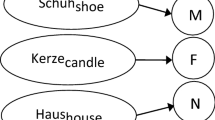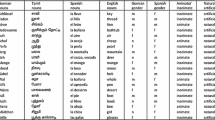Abstract
Can a linguistic device of a language orient its speakers to a particular aspect of the world and result in increased sensitivity to that aspect? The question was examined with respect to the biological gender marker in English and the lack of it in Chinese. In Experiment 1, English and Chinese participants listened to stories and answered gender and non-gender related questions immediately after. It was found that, relative to the non-gender-related questions, the English participants were much faster and more accurate than the Chinese participants in answering the gender-related questions. In Experiment 2, English and Chinese participants were asked to determine which of two pictures matched the sentence shown immediately before. Relative to the non-gender-related sentences, the English participants were less slower and more accurate than the Chinese participants in responding to the gender-related sentences. The findings support the view that language can have an effect on information processing in human cognition.
Similar content being viewed by others
References
Arnold J. E., Eisenband J. G., Brown-Schimdt S., Trueswell J. C. (2000) The rapid use of gender information: Evidence of the time course of pronoun resolution from eyetracking. Cognition 76: B13–B26
Boroditsky L. (2001) Does language shape thought? Mandarin and English speakers’ conceptions of time. Cognitive Psychology 43(1): 1–22
Boroditsky, L., Fuhrman, O., & McCormick, K. (in press). Do English and Mandarin speakers think about time differently? Cognition. doi:10.1016/j.cognition.2010.09.010.
Boroditsky, L., Ham, W., & Ramscar, M. (2002). Tense markers and event perception: Comparing English and Indonesian speakers. Poster presented at 8th Annual Conference on Architectures and Mechanisms for Language Processing. Tenerife, Spain.
Boroditsky L., Schmidt L., Phillips W. (2003) Sex, syntax, and semantics. In: Gentner D., Goldin-Meadow S. (eds) Language in mind: Advances in the study of language and cognition. The MIT Press, Cambridge, pp 61–79
Carreiras M., Carriedo N., Alonso M. A., Fernández A. (1997) The role of verb tense and verb aspect in the foregrounding of information during reading. Memory & Cognition 25: 438–446
Casasanto D., Boroditsky L. (2008) Time in the mind: Using space to think about time. Cognition 106: 579–593
Chang, B.-M. (2007). Ta cong nali lai? Xiandai nuxing zhicheng de yuanliu kaoshi. Lishi Yuekan, 237, 123–127. (Where does ‘she’ come from? An enquiry into the origin of the modern feminine pronoun. History Monthly, 237, 123–127.)
Chao Y.-R. (1968) A grammar of spoken Chines. University of California Press, California
Chen J.Y. (2007) Do Chinese and English speakers think about time differently? Failure of replicating Boroditsky (2001). Cognition 104(2): 427–436
Davidoff J., Davies I., Roberson D. (1999) Colour categories in a stone-age tribe. Nature 402(6762): 604–605
Gentner D. (2003) Why we’re so smart. In: Gentner D., Goldin-Meadow S. (eds) Language in mind: Advances in the study of language and cognition. The MIT Press, Cambridge, MA, pp 195–235
Gentner D., Goldin-Meadow S. (2003) Language in mind: Advances in the study of language and cognition. The MIT Press, Cambridge, MA
Gordon P. (2004) Numerical cognition without words: Evidence from Amazonia. Science 306: 496–499
Gumperz J. J., Levinson S. C. (1996) Rethinking linguistic relativity. Cambridge University Press, New York
Hunt E., Agnoli F. (1991) The Whorfian hypothesis: A cognitive psychology perspective. Psychology Review 98(3): 377–389
Imai M., Gentner D. (1997) A crosslinguistic study of early word meaning: Universal ontology and linguistic influence. Cognition 62: 169–200
January D., Kako E. (2007) Re-evaluating evidence for the linguistic relativity hypothesis: Response to Boroditsky (2001). Cognition 104(2): 417–426
Kay P. (1996) Intra-speaker relativity. In: Gumperz J. J., Levinson S. C. (eds) Rethinking linguistic relativity. Cambridge University Press, New York
Konishi T. (1993) The semantics of grammatical gender: A cross-cultural study. Journal of Psycholinguistic Research 22: 519–534
Kuczaj S. A. II, Hendry J. L. (2003) Does language help animals think?. In: Gentner D., Goldin-Meadow S. (eds) Language in mind: Advances in the study of language and cognition. The MIT Press, Cambridge, MA, pp 237–275
Levinson S. C., Kita S., Haun D. B. M., Rasch B. H. (2002) Returning the tables: Language affects spatial reasoning. Cognition 84(2): 155–188
Li P., Bates E., MacWhinney B. (1993) Processing a language without inflections: A reaction time study of sentence interpretation in Chinese. Journal of Memory and Language 32: 169–192
Lucy J. A. (1996) Grammatical categories and cognition: A case study of the linguistic relativity hypothesis. Cambridge University Press, Cambridge
MacWhinney B. (1987) The competition model. In: MacWhinney B. (Ed.) Mechanisms of language acquisition. Erlbaum, Hillsdale, NJ, pp 249–308
MacWhinney B. (2005) A unified model of language acquisition. In: Judith Kroll, De Annette Groot (eds) Handbook of bilingualism: Psycholinguistic approaches. Oxford University Press, Oxford, pp 49–67
Roberson D., Davidoff J., Davies I. R. L, Shapiro L. R. (2005) Color categories: Evidence for the cultural relativity hypothesis. Cognitive Psychology 50(4): 378–411
Saalbach H., Imai M. (2007) Scope of linguistic influence: Does a classifier system alter object concepts?. Journal of Experimental Psychology: General 136: 485–501
Sera M. D., Elieff C., Forbes J., Burch M. C., Rodriguez W. (2002) When language affects cognition and when it does not: An analysis of grammatical gender and classification. Journal of Experimental Psychology: General 131: 377–397
Spelke E. S. (2003) What makes us smart? Core knowledge and natural language. In: Gentner D., Goldin-Meadow S. (eds) Language in mind: Advances in the study of language and cognition. The MIT Press, Cambridge, MA, pp 277–311
Su, J.-J., Chen, J.-Y., & O’Seaghdha, P. G. (2009). Chinese speakers' sensitivity to the time of an action is related to the extent of their experience with English. Poster presented at the 15th Annual Conference on Architectures and Mechanisms for Language Processing, 7–9 September 2009, Barcelona.
Vigliocco G., Vinson D. P., Paganelli F., Dworzynski K. (2005) Grammatical gender effects on cognition: Implications for language learning and language use. Journal of Experimental Psychology: General 134: 501–520
Whorf B. L. (1956) Carroll, J. B. (Ed.) Language, thought and reality: Selected writings of Benjamin Lee Whorf. The MIT Press, Cambridge, MA
Author information
Authors and Affiliations
Corresponding author
Rights and permissions
About this article
Cite this article
Chen, JY., Su, JJ. Differential Sensitivity to the Gender of a Person by English and Chinese Speakers. J Psycholinguist Res 40, 195–203 (2011). https://doi.org/10.1007/s10936-010-9164-9
Published:
Issue Date:
DOI: https://doi.org/10.1007/s10936-010-9164-9




